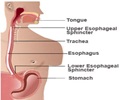Better overall survival was seen in patients with head and neck cancer who used antacid medicines to control acid reflux, found a new study from the University of Michigan Comprehensive Cancer Center.

The researchers looked at 596 patients who were treated for head and neck cancer. More than two-thirds of the patients took one or both types of antacid medication after their diagnosis.
Patients who were taking antacids had significantly better overall survival than those who did not take them. Proton pump inhibitors, which include drugs such as Prilosec, Nexium and Prevacid, had the biggest effect: a 45 percent decreased risk of death, compared to patients who did not take antacids. Patients taking histamine 2 blockers, such as Tagamet, Zantac or Pepcid, saw a 33 percent decreased risk of death.
"We had suspicions that these medications somehow had a favorable impact on patient outcomes. This led us to review our large cohort of patients and screen them for common medications, focusing on antacids. In fact, our study did show that people taking antacids are doing better," says lead study author Silvana Papagerakis, M.D., Ph.D., research assistant professor of otolaryngology--head and neck surgery at the University of Michigan Medical School and an adjunct clinical assistant professor at the U-M School of Dentistry.
Results of the study are published in the December issue of Cancer Prevention Research.
The researchers are not clear why these medications affect the cancer, although they have begun additional work to understand the mechanisms involved.
Advertisement
In addition, the researchers would like to understand if using antacids in people with reflux disease or people with precancerous lesions might reduce their risk of developing head and neck cancer.
"What this study makes clear is these medications may be more beneficial to the patients than just controlling side effects," she says.
Source-Eurekalert















